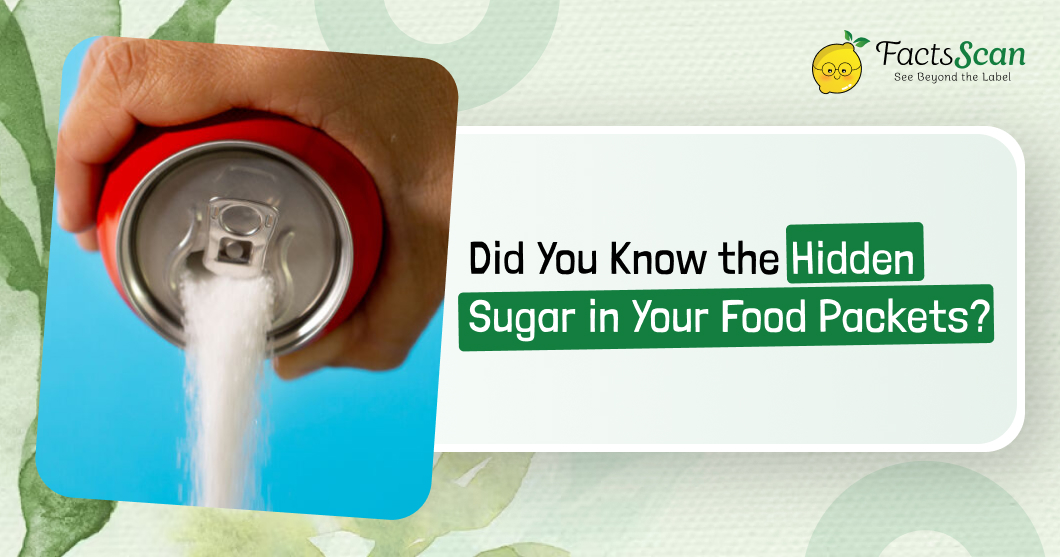Did You Know the Hidden Sugar in Your Food Packets?
Summary :
Many packaged foods contain hidden sugars that can significantly contribute to your daily intake, even in items you might not expect, like sauces, snacks, and processed meals. Understanding these hidden sugars is key to making healthier food choices.
Check the food labels in your kitchen—How much sugar are you consuming daily?
Nowadays we see that more and more people are becoming more aware and conscious about their food and health because of incremental rates of different diseases, environmental changes, lifestyle, eating habits, and of course social media on which much good content is available to make us more aware. But, wait we all feel in our life whenever we take extra care there is always some sneaky culprit that comes under our eye and harms us, it is none other than but a sweet position – Sugar. In this blog, we will see the mystery of hidden sugar in packed food and help you make informed decisions for a healthy lifestyle.
What Is Hidden Sugar?
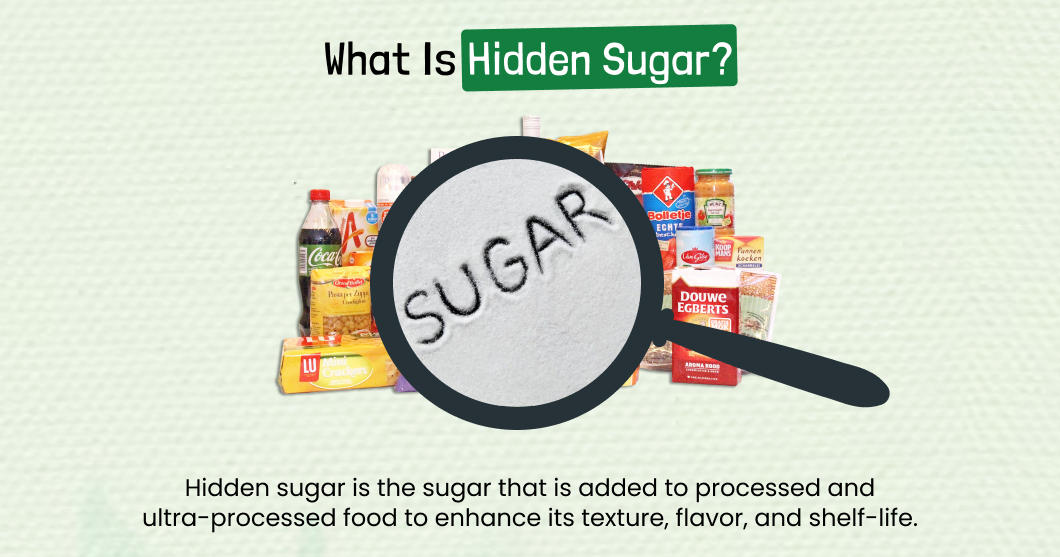
Hidden sugar is the sugar that is added to processed and ultra-processed food to enhance its texture, flavor, and shelf-life. It’s not like exists in only obvious sweet products like biscuits, ice cream, and chocolate but is also found in many healthily labeled products such as :
- Flavored yogurt
- Granola bars
- Breakfast cereals
- Sauces and dressings
- Energy drinks and fruit juices
The more shocking thing is sugar exists in salty, spicy, and unexpected food items like pasta, chips, baked beans, salad dressing, peanut butter, and bread. Manufacturers cleverly add sugar to enhance test and texture with other label names.
How Sugar Hides on Labels
You may be wondering how sugar remains so well hidden. It comes down to the way it’s listed on food labels. Food manufacturers use multiple names for sugar, making it difficult for consumers to recognize. Some common aliases for sugar include:
- High-fructose corn syrup
- Dextrose
- Maltose
- Sucrose
- Barley malt
- Cane juice
- Fruit juice concentrate
- Molasses
- Agave nectar
- Raw sugar
- Brown sugar
- Corn sweetener
- Glucose
It’s most required to check the ingredients list closely. If you see any such names, sugar is lurking in the food, even if the product is labeled healthy.
The Impact of Hidden Sugar on Your Health
Excessive sugar consumption is directly linked to various health issues like tooth cavities, obesity, diabetes, and heart disease. Hidden sugar often leads to these conditions because we don’t know that unknowingly we are consuming higher than the required amount of sugar which is slow white poison that slowly kills our organs. The American Heart Association recommends no more than:
- 25 grams (6 teaspoons) of sugar per day for women
- 36 grams (9 teaspoons) for men
However, many processed and ultra-processed foods consumption quickly cross the per day limits for example, one energy drink contains almost 40-70 gm of sugar, which is around double our daily consumption limit.
How to Avoid Hidden Sugar
Here are some tips which can help you to manage hidden sugar:
- Read the Labels: Always check the first few ingredients from the list if sugar comes in the top 3-4 ingredients then try to avoid that product. Also, check different names of sugar.
- Choose Whole Foods: Choose natural forms of food like fruits, vegetables, and whole grains. They are unprocessed so they contain naturally low sugar.
- Go for Unsweetened Versions: Always opt for unsweetened food options like plain oats, plain yogurt, or milk, and add natural toppings to enhance the taste like fresh fruits, honey, cinnamon, jaggery, and many more.
- Make Your Own Sauces and Dressings: Mostly all ready-made sauces and dressings contain excessive sugar for a better taste and texture, so avoid using it and make homemade sauces as per your requirements and taste.
- Watch Portion Sizes: Even healthy foods like granola or fruit juices can be loaded with sugar. Keep an eye on portion sizes to avoid excess intake.
How Sugar Impacts Our Body Parts
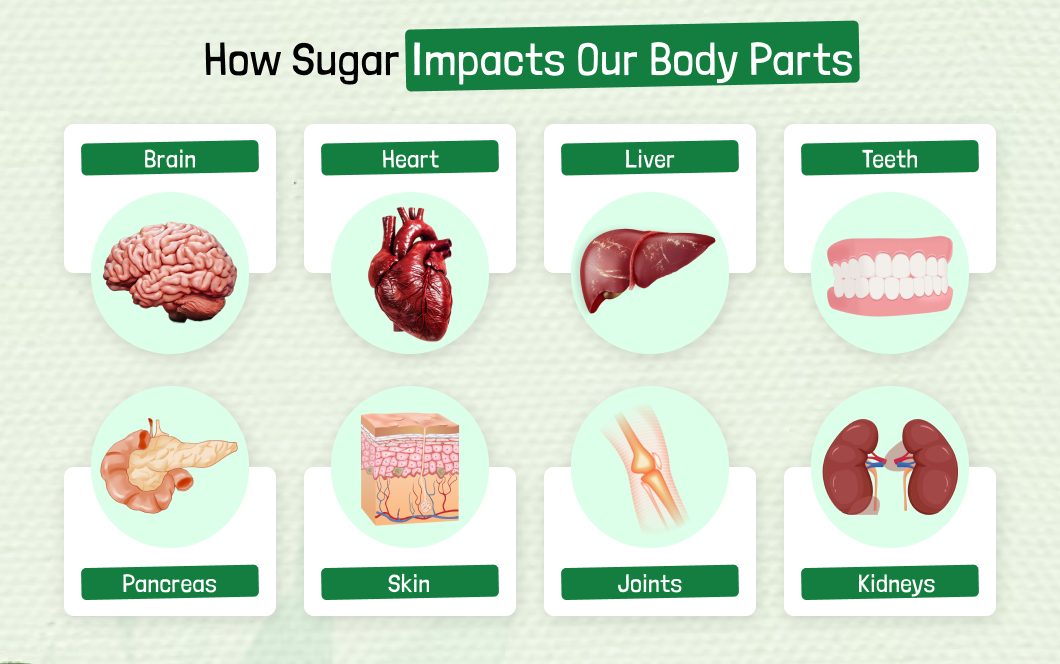
Overconsumption of sugar not only leads to obesity or diabetes but it affects our whole body from head to toe. Here let’s see how:
1. Brain
We heard that sugar can give an energy boost but it is temporary, excessive and regular consumption of sugar affects the brain by damaging blood vessels which later on affects brain cells, it also creates anxiety and depression, and it may affect learning and memory.
2. Heart
A high amount of sugar is directly linked to heart disease, blood pressure, and cardiovascular issues. Excess sugar can cause fate to collect around organs and it may raise the risk of stroke or heart attack
3. Liver
Your liver metabolizes fructose, a type of sugar found in many processed foods. When you consume too much fructose, your liver converts it into fat, which can lead to non-alcoholic fatty liver disease (NAFLD). Over time, this condition can impair liver function and lead to severe health complications.
4. Teeth
Too much sugar directly affects our tooth’s outermost layer of enamel and weakens it which leads to cavities. Without taking proper care of mouth and teeth after eating sugary food and beverages causes many dental issues.
5. Pancreas
The pancreas produces insulin which manages our blood sugar levels. If we consume more sugar then it has to work too hard and we struggle to manage normal blood sugar level which lead to insulin resistance which may raise the risk of type 2 diabetes.
6. Skin
Sugar can accelerate many skin issues like glycation- which damages collagen and elastin in the skin and causes wrinkles, sagging, and dullness. Over-sugar can also cause redness, puffiness, acne, rosacea, and psoriasis.
7. Joints
More sugar consumption especially added sugar consumption increases inflammation which worsen the symptoms of arthritis and other joint-related issues and stiffness.
8. Kidneys
Kidneys filter waste from the blood. High blood sugar damage the normal functioning of kidneys which leads to kidney disease. This causes blood vessels to narrow down and clog, reducing blood flow to the kidneys. If it is not treated properly then can cause kidney failure, especially in diabetic people.
Conclusion
Stay alert about hidden sugars that can greatly impact your diet and health. Reducing hidden sugar from the diet can benefit the entire body—from the brain to the joints. While the occasional treat is fine, regularly consuming high levels of sugar can harm health in more ways than one. Regularly review the nutritional labels, and consider reducing processed foods to improve your lifestyle. A little effort goes a long way in steering clear of unnecessary sugar!
Ready to make Healthier Choices?
Download FactsScan now from the Google Play Store and App Store and take charge of your food choices.
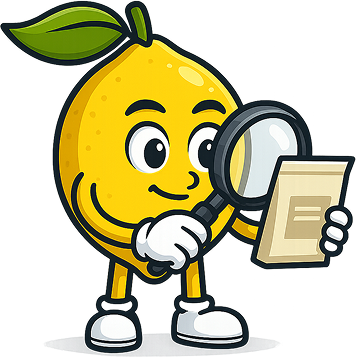
Recent Articles
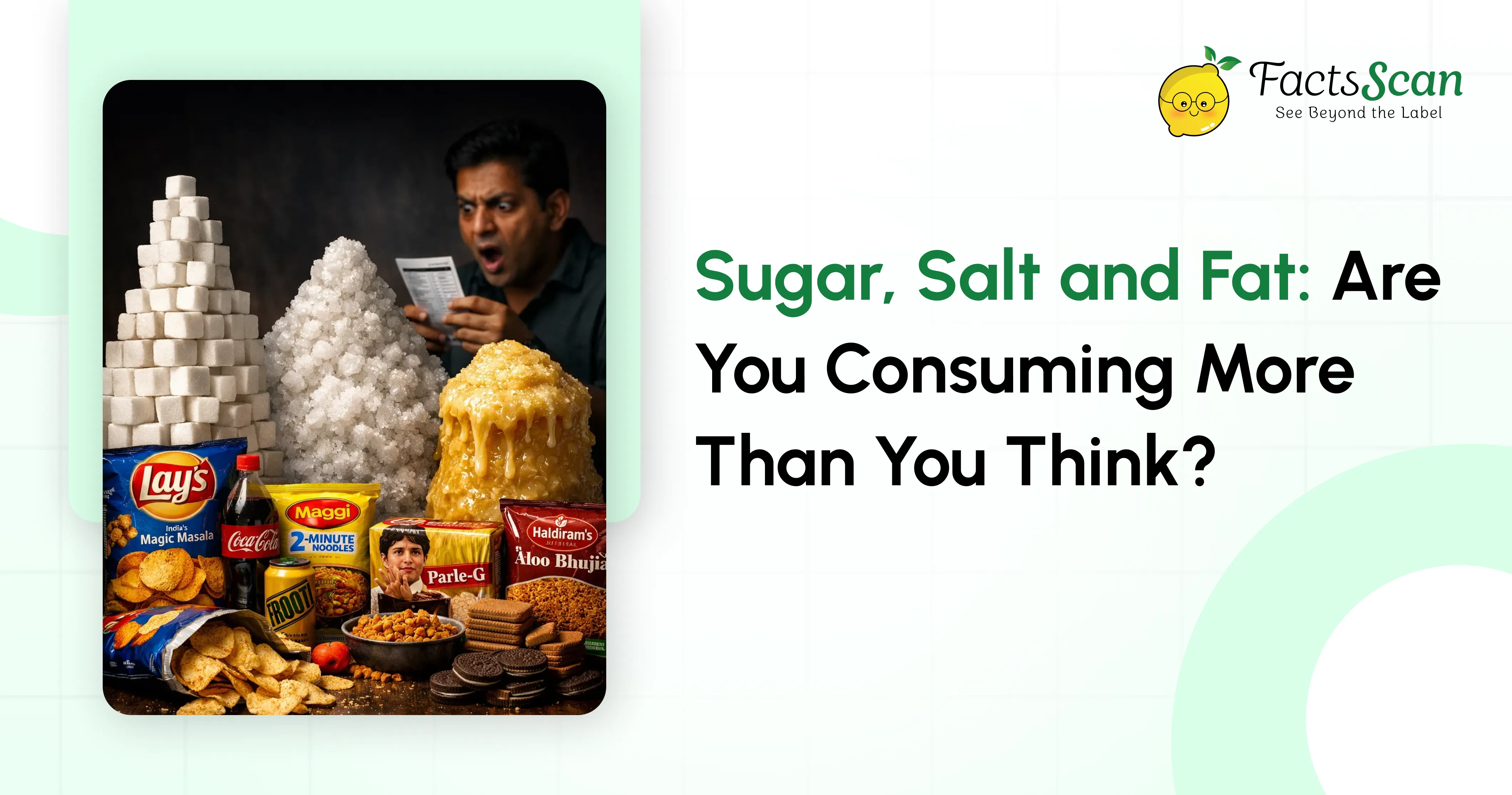
Sugar, Salt and Fat: Are You Consuming More Than You Think?
Packaged foods silently contribute excessive sugar, salt and saturated fat to your daily diet through hidden ingredients like palm oil and added sweeteners, often exceeding safe limits without your knowledge.
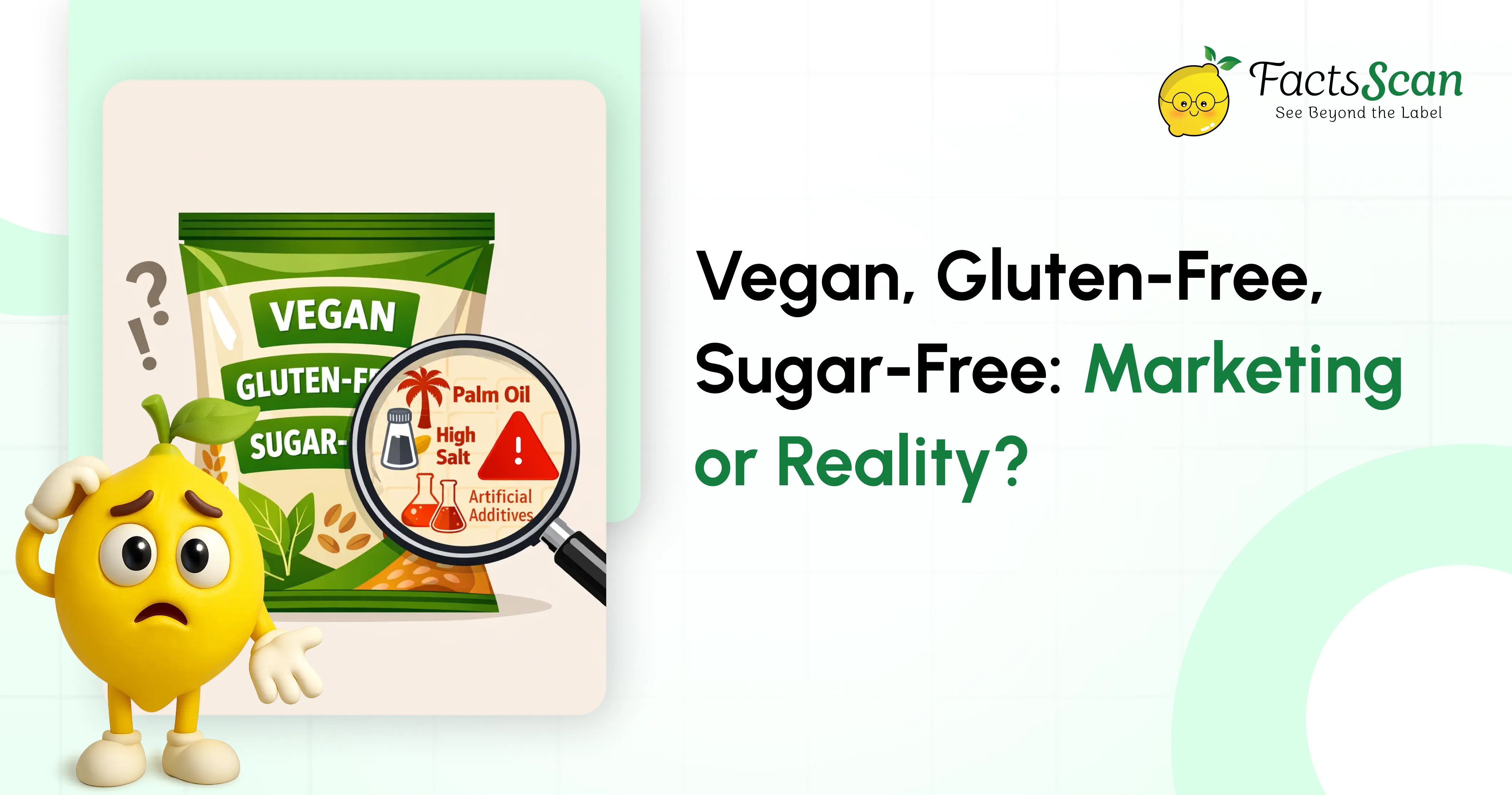
Vegan, Gluten-Free, Sugar-Free: Marketing or Reality?
Vegan, gluten free and sugar free labels attract health conscious shoppers, but these marketing claims do not guarantee nutritional quality and often hide excessive palm oil, salt, saturated fat and artificial additives.
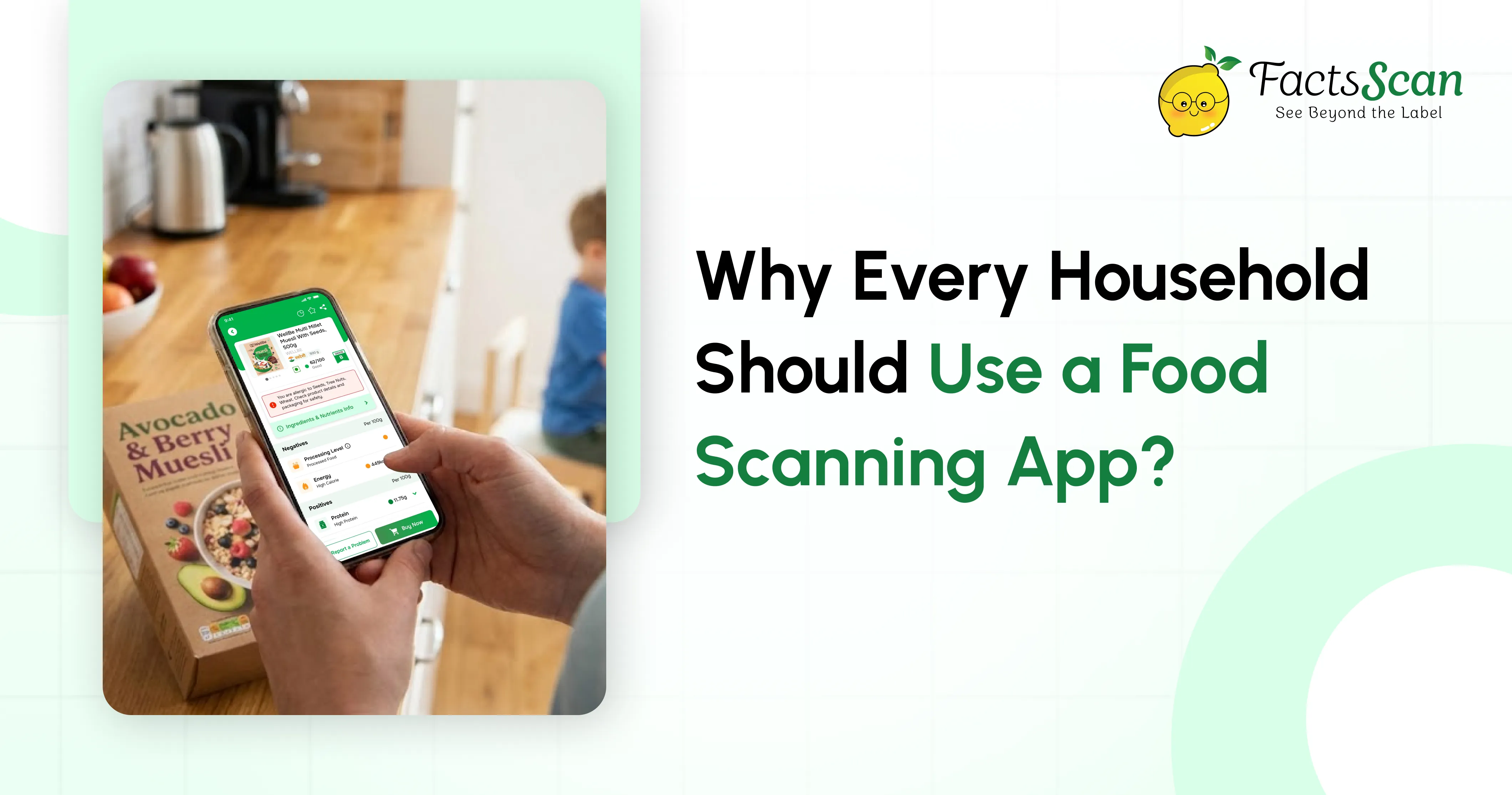
Why Every Household Should Use a Food Scanning App?
Modern households face hidden risks in packaged foods like palm oil, excess salt, and allergens. A food scanning app helps families make safer, informed choices by instantly decoding complex labels and identifying harmful ingredients before consumption.
 28 Nov 2024
28 Nov 2024 6 Min Read
6 Min Read 
